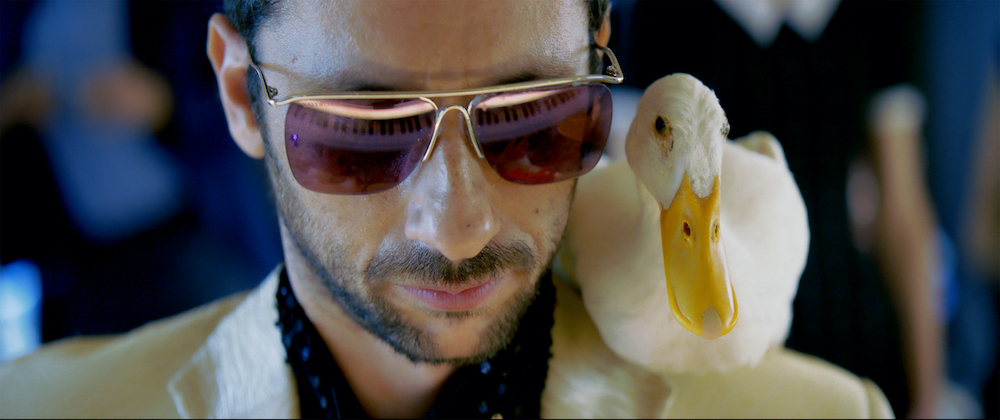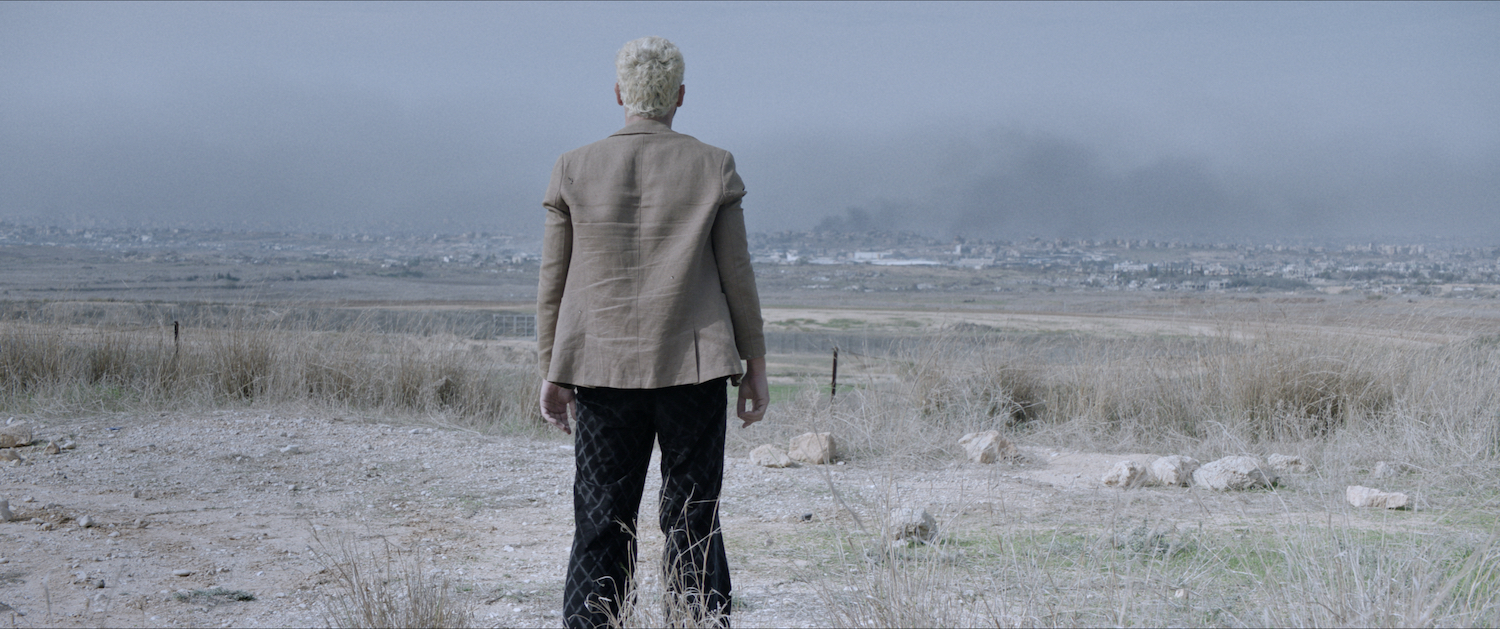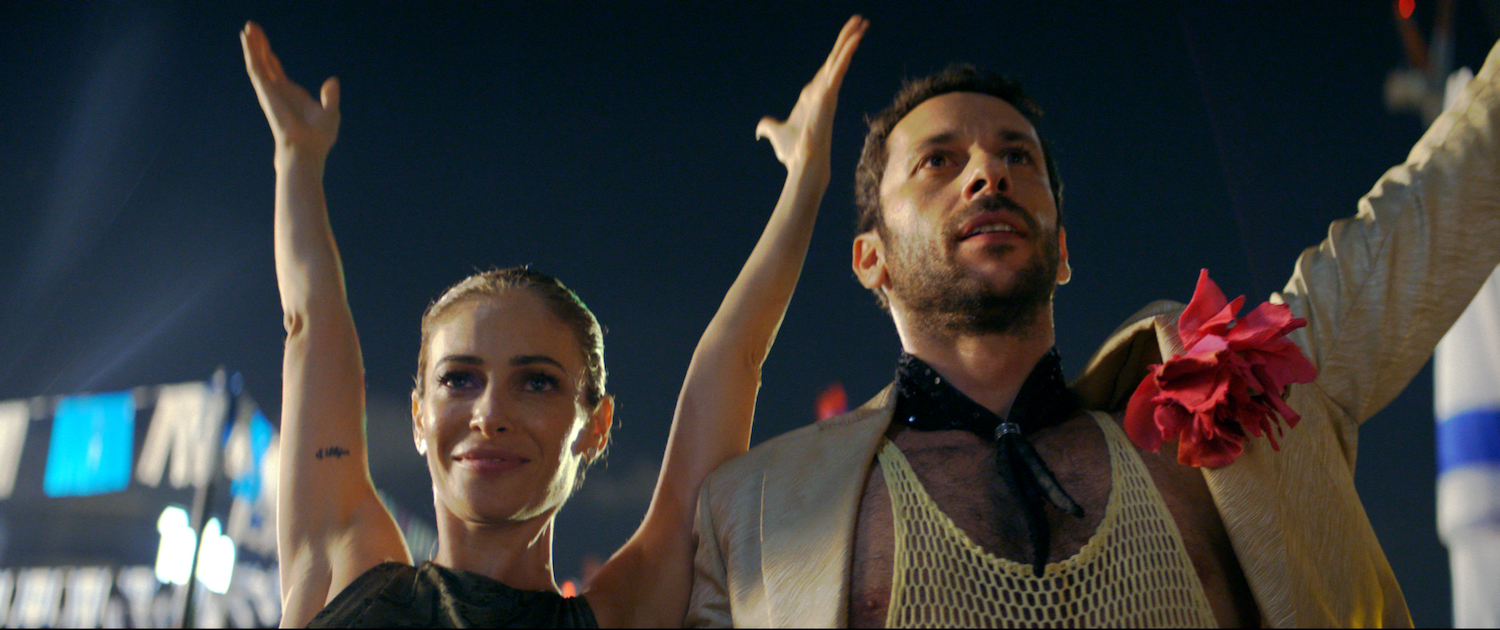Nadav Lapid: „People need to put in a lot of effort not to see. I see in Israel a huge blindness”
It’s very rare to come out of a film feeling nauseous and appreciate the filmmaker for it. Yet appreciation might not be the best word to describe it – you exit Yes as if you’re descending from an ever-spinning merry-go-round of lies and horrors. I tell Nadav Lapid this and he admits that, paradoxically, there should be an element of fun to the circus of vulgarity in his film.
Set (and filmed) in Israel after October 7th, Lapid’s cinematic frenzy is viscerally damning in relation to his homeland’s blindness towards its regime and acts of oppression. In a discourse that cries for showing “both sides”, Yes is that other side, a critique from the inside, with Lapid having emigrated to France only a few years ago. Engaging with flagrant pieces of state propaganda but also not shying away from discussing the crimes that are currently being committed in Palestine, Lapid asks the question of whether anything else still matters in the face of atrocity.
I sat at the Karlovy Vary International Film Festival with Lapid to discuss his film – after a vaguely eventful public screening in the town’s Municipal Theater. A few festival goers had laid out an Israeli flag in the upstairs balcony, presumably having not seen any of Lapid’s films before. The flag was not removed, nor was it particularly noticeable for any of the staff, but I can’t help but understand it as a manifestation of a double standard. I’ve seen Palestinian flags be taken down with extreme urgency, whereas, either out of irony or collective inertia, this flag remained unbothered until the people in case took it down – just before the credits for Yes rolled. I tell Lapid, “You’ve either disturbed them or opened their eyes”. He retorts: “One less Israeli flag… I mean one less flag – in general – in the world is a good thing. You know, flags are not the best invention.” That the flag remained there for the duration of the film was also an accidental gesture of expanded cinema, as it only extended back into the real world a blindness that Lapid calls a nationalistic hysteria.
We start the discussion by talking about flags, halls of mirrors, blindness and kitsch, only for Lapid’s commitment as a “filmmaker of the present” to take over as we reach the subject of new images and the future of cinema.
***
You do see a lot of flags being paraded and overtaking public space in your film. One of my modern history professors in university used to say that when countries start displaying flags to such an obsession that usually suggests a crisis of identity or legitimacy. I’d say this is what your film explores to a certain extent; you have this one specific moment, when the main character briefly says he doesn’t even know what “being Israeli” means.
That’s a very intelligent observation. I see in Israel a huge blindness, and it began way before the [current] war. I think that when the war started it was a huge test for this blindness and it showed to which extent it’s developed. But people need to put in a lot of effort not to see. I mean, it’s extremely demanding not to see. So, in a way, part of this joyful, nationalistic hysteria that you see in the movie, it’s efforts not to see, not to open the eyes. You move from left to right, from right to left, from left to right and then you’re busy enough and you don’t need to see anymore.
I think it was Godard who once said that Israelis are a film of fiction, and Palestinians are documentaries.
I don’t know if it’s any kind of reference, but there is one scene in the beginning when the main character goes underwater in a pool and these tiny plastic balls come up to the surface. It reminded me of a similar image in a Seijun Suzuki film, Kagerou-za. I thought a lot about its title in relation to Yes, which translates to “Heat Haze Theatre”. Your film is, I suppose, about a so-called theatre of war, but it is the theatre of it that is more evident than anything else. If I understand it right, your intention was to depict Israel at this point in time as a hall of mirrors – a hall of smoke and mirrors, if you will… Was this vulgar, glutinous opulence, combined with that blindness, an important point for you to make?
I haven’t seen that film, [so it’s not a reference]. But the idea was inspired by some [Japanese] video art, in a way. However, that is a very accurate description of [what is happening]. I felt that the truth around me is something that is always in constant motion, moving between one thing and another thing at all times. I felt a total loss of complexes, people who are free from each and every complex, and a total loss of tenderness. When you take together those two ingredients, double them on steroids, I think this is what you get. I think that Israel, for instance, as a place, sometimes it’s good, sometimes it’s bad. There’s something disgusting and poetic about it at the same time.
It’s a place where people can easily tell you sentences like, “I hate art”. “I hate artists”. “I will never read a book”. In France, where I live, people will not say it even if they do it. In Israel, there are moments in time when people put everything out there. In a way it still is unconscious, but it’s as if the unconscious manifests itself and nothing remains in the dream. Every fantasy is manifested. When you combine that with vulgarity and lack of complexes, you get what you see in the film.

When I interviewed you the last time (A/N for Films in Frame no.1) for Ahed’s Knee we discussed geography and landscape as important elements in your films, and you do see it in Yes as well, especially when the main character goes out of the city and watches Gaza from afar. Of course, generally the question of “land” always comes up when talking about the dilemma of Israel. But what I took from this film, in conjunction with these oligarchs – there’s a certain real estate element to the definition of land that really glares back at you, mainly since it’s also been speculated by various powerful idiots in the world in relation to the region. On the one side, you have these very glossy facades in Tel Aviv, these resorts, and then there is Palestine, a land you see very little – present by virtue of absence, seen from a distance and closed-off.
I think it was Godard who once said that Israelis are a film of fiction, and Palestinians are documentaries. Tel Aviv is a city, but it’s not a real city. It’s a city coming from fairytales. Everything there is the most exciting it could be. Nothing is vague and nothing is trivial. Every, let’s say, tree is a door that will lead you to the sky, to heaven, to redemption etc. Every piece of sidewalk is a party.
This panoramic movement from an intimate story of a couple to the land where true killing is taking place is connected to one question laid out by the film. Does anything matter except for this? Is there anything but the killing, in the end? The way I understand it, this desperate battle of these people to be blind is a desperate battle to say that there are other things. We are not only killers. Maybe they think they are not killers at all, but let’s say [it’s a question of] “we are not only”. We also have a love life, we have a sex life, we have parties, we have souls, we have emotions, we have 10,000 things, we have babies, we have a future, we have a past, we have a career, we have hope etc. I wanted my film to constantly raise this tension, but also to constantly shut it down, [in light of that question of does anything matter].
The name you chose for the protagonist, Y (read as Yid) feels charged with many meanings. Did you intend him as a metaphor for a larger group, given this reading? Obviously, the Y also suggests the Yes in the title, as the answer to your binary question of giving in or protesting.
Well, naming the main character after a letter is a way to say that characters don’t exist. It’s a way to subvert this phenomenon of characters, this stupid game of biography of, oh, who were his parents, what kind of name is more appropriate for him and so on. When you call him Y you say he doesn’t exist. And by not existing, he’s all of you and all of us. By not existing, he becomes omnipresent. By not being particular, by not being an individual, he’s not one character, he’s all the characters. You would say he’s an “X” (like John Doe), but he’s not exactly X, he’s Y, which is the brother of X. But to have named him X, it would have made it too symbolical. At the end of the film you treat Y as an ordinary thing. You forget that his name is a Y. Which is okay, because cinema is a beautiful lie.
Correct me if I am wrong – perhaps it’s because I come from a formerly communist country and it’s easier for us to detach the people from the regime – but I also understood your film as a commentary on the society behind the regime. That there are individuals behind it all that may be trying to navigate what is happening.
The key question is, what are Israelis? How do you define them? Can you resume them by the atrocities that are committed by them – or in their name –, or are they something else? This is something that the film examines many times. There is this scene between the couple, not the main couple, but with Y and another woman, taking place on the hill. It is strange because there is something very melancholic and sensitive about it, but it happens while bombs are falling. It’s as if it was taken from a different film. But there is the question there, are these people something else, too? [Can] they be something else [in the face of] a bombed Gaza?
My cinema is based on a lot of elements at one time and each one of them is singing its own anthem. For me is the closest I feel that cinema can relate to the truth of the moment, which is chaos.
Later on, also looking towards Gaza, Y delivers on a similar hill these atrocious lyrics of a propaganda song. You’ve referred to this as him “bombing Gaza with melody”. Music is indeed very present and very atrocious in your film – I’d call it a musical of cacophonies. Was it something in particular that interested you about the music that you picked?
I’m in general interested in using trash or kitsch. For one, trash and kitsch are parts of the human soul, and rather interesting parts of the human soul. And I also think that cinema audiences are very shielded today, by the films that they see, by their references… I feel that first of all you need to break that shield. And trash and kitsch, and especially trash and kitsch music, are a way to penetrate inside.
At the same time, I like to think that my frame, my cinema is based on a lot of elements at one time and each one of them is singing its own anthem. Each one of them is the queen of the moment. A little bit like in the song battle at the beginning, when it’s Elvis’ Love Me Tender vs. Be My Lover. The film is an endless battle between elements, creating this cacophony, which for me is the closest I feel that cinema can relate to the truth of the moment, which is chaos.

You were mentioning this sheltering that cinema offers us, and I assume, in a way, you have been asked this question a lot about your film, since in Cannes it didn’t premiere in the main competition and there’s some discussion about its limited prospects of distribution, because it talks about the massacre in Palestine. The discussion extends beyond that, with people pointing out that the industry pretends to be political, it talks about the desire to acknowledge things, but does little for the distribution of films on the subject. Do you think there’s any responsibility for film festivals or film bodies?
I’m less connected to the idea that someone has to do something, because I’m a big believer in beauty and in cinema. I’m not an engaged filmmaker or a militant. I’m not interested in using cinema as a tool to get somewhere. For me, the only sanctified place on earth is the screen.
So I wouldn’t like it that [a festival has to do something]. The moment a film festival will have to do things because they have to do it, it would be like a kid who’s taking medicine, you know, because he has to. The point of my film isn’t to be any kind of medicine. There is a lot of political cinema that looks like medicine: austere, extremely serious, didactic movies about a topic and the only card they are waving is that they are important. There are other ways much more efficient to influence reality than to make a boring film. This is already a position of weakness. If you put yourself in the place that people will have to, need to screen your film…
My disagreement with these [industry] people, [and the state of cinema] is what is beautiful, not what is moral. For me, mild, safe films are unbearable to watch. It’s not like I’m tempted to watch it, but I know that it’s more important to do other stuff.
Let’s take the films of Pasolini. We began with the question of fun. It’s huge fun to see them. I would watch them again and again. But if Pasolini had been a filmmaker today, he would have premiered in something like the Peasants Film Festival in the south of Italy, not in Cannes, not in Venice, not in all these places. Because I think these people have lost their sense of beauty. This is the real problem. They forgot that the only way beauty arrives, the only way to get to real beauty is to lose your hold on earth. And to lose your hold on earth is to face the unbelievable. They only take very believable films. Films that are so believable that you know exactly what they are composed of before you see them. You need to see seven minutes of them [and you already know].
You can use words like cowardice, and fear, and lack of political consciousness, but the problem for me is bigger. Because they betray art. Okay, they will betray politics. Let’s say, okay, they don’t care about the destiny of Palestinians. Let’s say, okay, maybe they don’t care about the future of humanity. But they are cinema people and they do not care about cinema? I think this is essentially a matter of not caring about cinema. Because, in the end, it’s killing cinema. If you gather more and more of these kinds of films, why have films at all?

During the Q&A here in Karlovy Vary you also talked about this paradoxical situation, of having your eyes open and yet being completely blind. Image and propaganda have a long history, but today we live in this world of multiple screens and hyper-visibility, and yet it seems that we are blinder than ever before. You made a comment about how your intention was, when watching the film, that the audience would not feel any difference from when they are gazing up from their phones. That one screen continued the other. You’ve always been keen to integrate images from outside of cinema into your films, which was very evident with Ahed’s Knee. You take it up to an even more intense level in this new film. How do you understand this multi-screen reality in relation to Yes?
The mixture of images in the film… I intended the film to talk about a legend, but a YouTube kind of legend, in a way. The way this national anthem is being prepared is a bit like the wizard of Oz, if that makes sense. It’s building up to it, you want to meet it, he is going up the hill, going to see Gaza, doing all these things [in preparation and anticipation]. And then what you see is a YouTube video of it, a real video. In the end, the wizard of Oz is a guy who is your neighbor, [it is ordinary]. What I mean by that is that the highest level of fiction is pixelated truth.
There is a lot of political cinema that looks like medicine: austere, extremely serious, didactic movies about a topic and the only card they are waving is that they are important. There are other ways much more efficient to influence reality than to make a boring film.
And I think this is something that is given to us by this multi-screen system. It gives us a new notion of foreground and background. It gives us an existential foreground-background. I try to think what filmmakers from the past, what a guy like Erich von Stroheim would have done with an iPhone – or rather in a world where the iPhone exists. That’s why in the film I try to go already a little bit into the future; there are these small moments with people who have their own heads become screens, and they screen what is inside. I try to anticipate the moment when our own heads become screens. I don’t want to miss that moment, even if I die before it happens, so I want it to be in the film.
[To return to our contemporary multi-screen society], I feel that the best kind of work is work where you have many potential layers of meaning in one same second. I’ve said this before, but it all boils down to the fact that I am a huge fan of the present. If you work in cinema you must be in tune with the present. If you’re a filmmaker, in a sense, you worship the present – yes, while cursing it, yes, while spitting on it. But you worship the present.
We live in a post-language universe. I think my film is celebrating all of this. I think cinema… You can and you need to be very critical about [the supremacy of the image], and it is a tragedy that language has been made void of its sense. At the same time, however, in the history of cinema, films were made and viewed for many years before language [sound] was invented. So maybe now we’re starting to live in its post-language phase. Let’s try to get back to the level of Charlie Chaplin.
Photo main & header: KVIFF

Graduated with a BA in film directing and a MA in film studies from UNATC; she's also studied history of art. Also collaborates with the Acoperisul de Sticla film magazine and is a former coordinator of FILM MENU. She's dedicated herself to '60-'70s Japanese cinema and Irish post-punk music bands. Still keeps a picture of Leslie Cheung in her wallet.
